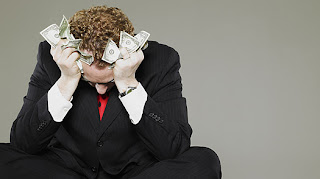 Psychotherapy can boost happiness more than money! Those are the astounding results from an English study to be published online Nov. 18 in the journal Health Economics, Policy and Law. But I ask you, have you ever heard anything more absurd?
Psychotherapy can boost happiness more than money! Those are the astounding results from an English study to be published online Nov. 18 in the journal Health Economics, Policy and Law. But I ask you, have you ever heard anything more absurd?
According to the study, which analyzed data on thousands of people who provided information about their mental well-being, a $1,329 course of psychotherapy increased happiness to the equivalent of a $41,542 pay raise.
Uh…anyone else see the stupidity in this?
“We have shown that psychological therapy could be much more cost effective than financial compensation at alleviating psychological distress,” said study author Chris Boyce, of the University of Warwick. “This is not only important in courts of law, where huge financial rewards are the default way in which pain and suffering are compensated, but has wider implications for public health and well-being.”
 The absurdity keeps growing and growing…
The absurdity keeps growing and growing…
“Often the importance of money for improving our well-being and bringing greater happiness is vastly over-valued in our societies,” Boyce explained.
That’s certainly true, evidenced by the completely over-valued premise directing this study.
“The benefits of having good mental health, on the other hand, are often not fully appreciated and people do not realize the powerful effect that psychological therapy, such as non-directive counseling, can have on improving our well-being.”
OK, here’s my problem: First, the notion that anyone can achieve perpetual happiness is ridiculous. Any pursuit of such is foolhardiness–the quickest way to depression. Who would want perpetual happiness, anyway? No growth or development can occur in that. And how would we know what makes us happy without unhappiness or dissatisfaction as a relative marker? Everything would be taken for granted. Perhaps we would be like satisfied zombies…on a never-ending Prozac trip. Yeah, that sounds awesome…
 Next, how on earth do you qualify happiness? With a monetary figure? $41,000? Heck, not in my checkbook. I’m not happy with less than $50K. Freakin’ idiotic I tell ya. And then it brings up the question of all the politically-based rhetoric revolving around socioeconomic status. Listen, I’m the first one to say that life is a hell of a lot easier when you know where the rent is coming from. Happier…no. Less freaked out? Damn straight.
Next, how on earth do you qualify happiness? With a monetary figure? $41,000? Heck, not in my checkbook. I’m not happy with less than $50K. Freakin’ idiotic I tell ya. And then it brings up the question of all the politically-based rhetoric revolving around socioeconomic status. Listen, I’m the first one to say that life is a hell of a lot easier when you know where the rent is coming from. Happier…no. Less freaked out? Damn straight.
Third, it’s an awfully grand assumption to think this study reflects all people and what make them tick. Since the study is looking at an increase in happiness (whatever that is), then surely these findings do not reflect those people that either refrain from qualifying life in that manner (like me), or those that already consider themselves to be happy. So…how do we really know? I mean, I’m not interested one iota in psychotherapy, especially not as a pain and suffering substitute in legal proceedings. No thank you. I’ll take the cash.













